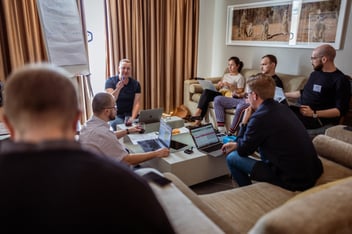Henley's Professor in Leadership, Bernd Vogel questions the role the Democrats played in Trump's win.
You can endlessly analyse the Trump phenomenon. This is needed and urgent. Yet should the other side of the election result be let off the hook when it comes to leadership scrutiny and analysis?
Having 72 million or more votes for the Democrats in the USA does not really look like a failure. However, it is also just not enough. From a leadership lens it means: The shared purpose was not successfully embedded, and goals were not achieved.
A while back I took a similar lens: Instead of asking what was wrong about Brexit, the people behind it and those voting for Brexit, why not take a leadership lens to understand why Remain did not work? Many did not like that question then, and they might not like it today when referring to the US election result.
Anti is not enough
In the German weekly paper Die Zeit, Jagoda Marinić wrote that “Anti is not enough” (Anti ist nicht genug) about the Democrats. Interesting.
In our book Fully Charged, we recommend using threats, pressures or crises - being up against the wall - in business as a leadership strategy to mobilise your organisation.
It speaks to what research calls ‘prevention focus in people’, the motivation to overcome a difficult situation. However, just evoking the danger and threat without a clear, relatable path out of it that is meaningful to people, won’t work.
Overheating your energy trajectory
Every campaign or business wants to mobilise its collective human force - the supporters, voters, co-workers - to enable success.
The real question though is not how to run fast for a few hundred metres, but how to run fast for miles and miles in a sustainable manner without getting lame or collapsing. Politics, life or business is about what is happening over time, not about short blips and outbursts.
In our research at Henley, we differentiate between five different energy trajectories (Vogel, Raes, &Bruch, 2022) .
I wonder if the Democrats found themselves in a trajectory of what we call Overheating? After the nomination, there was for some weeks a steep increase in enthusiasm, forward thinking, effort and activity for the campaign. It then hit a peak, an inflection point from which it looked like the excitement and momentum began to decrease. Were they no longer reaching the people? Maybe some doubts formed leading to campaigners and voters investing less?
The collective human energy implodes. What we find is that key people ignore this dynamic, and we see downward spirals. While at the surface there is action, people are exhausted, negative feedback from polls might sap the collective excitement step by step. If you don’t think about leading over time, the journey will be difficult.
To learn or not to learn
Learning and reinventing themselves is a key capability of successful leadership teams. Success is in the way of development as much as failure is not conducive to reflection, introspection, mutual challenge and feedback.
So, my questions to ask: What are the current learnings in the Democratic senior team and party? Some say we saw the same pattern of electioneering during the last three rounds. Is this what we call a knowing-doing-gap in leadership (Ahmadi & Vogel, 2023). This is where the party and its leaders actually know a different way of running an election, but the inner dynamics have prevented them from doing so for some reason.
Or is there a lack of understanding to find out what matters, or where and how the discourse is happening and how those processes might have changed? Is the senior leadership group capable of adapting or more so reshaping these processes?
This is exactly what we would ask an executive committee in a similar situation during some difficult conversations.
Industry 5.0 is revolutionising work and leadership, driving organisations to radically rethink their strategies or risk obsolescence. Henley's newest report, Leadership Futures: Advancing into Industry 5.0, introduces key themes for positive change in Industry 5.0.
Access the full report here.
Professor Bernd Vogel
 Bernd is a Professor in Leadership, Founding Director Henley Centre for Leadership UK & Henley Centre for Leadership Africa, and Research Division Lead at Henley Business School, University of Reading. He helps organisations with his expertise in strategic leadership to mobilise and sustain energy and performance in organizations, senior management teams, future of leadership, multi-level leadership, leadership development, and leading transformations, culture and change.
Bernd is a Professor in Leadership, Founding Director Henley Centre for Leadership UK & Henley Centre for Leadership Africa, and Research Division Lead at Henley Business School, University of Reading. He helps organisations with his expertise in strategic leadership to mobilise and sustain energy and performance in organizations, senior management teams, future of leadership, multi-level leadership, leadership development, and leading transformations, culture and change.



